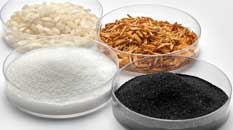German firm Continental says is increasingly focusing on renewable and recycled materials in its tyre production. While the share of these materials averaged 26% in 2024, the tyre manufacturer expects an increase of two to three percentage points in 2025. By 2030, the share of renewable and recycled materials is set to rise to over 40% – while maintaining consistently high safety and performance standards.
Carbon black and silica play a crucial role in this transformation because, alongside rubber, they make up a large proportion of the raw materials in tyre production. Both are fillers that make the rubber, for example in the tyre tread, resistant and are also responsible for essential tyre quality characteristics such as grip and braking performance.
Continental adds it is increasingly using silica variants derived from the ashes of rice husks across its whole tyre portfolio. Rice husks are an agricultural by-product of the Asian agricultural industry and Italian risotto rice production. This type of silica is manufactured by Solvay in Italy, among others.
Innovative processing methods are used to turn this agricultural by-product into silica. The method of production from biomass is more energy-efficient than conventional production processes. Silica from rice husk ash thus supports the circular economy and contributes to a more sustainable value chain.
Traditionally, the raw material is obtained from quartz sand. Silica has been an important complement to carbon black as a filler in many tyre rubber components for around 30 years – Continental was an early pioneer of this innovative technology.
Silica has revolutionised the safety and energy efficiency of tyres and played a crucial role in reducing braking distances by almost 50%. Just as importantly, using silica in tread compounds helps to reduce rolling resistance and therefore energy consumption and CO2 emissions. This highlights how the use of a more sustainable material such as silica in Continental’s tyre production can have a positive effect along the value chain.
Carbon black offers great potential on the path to more sustainable tyres. Accounting for up to 20% of the total weight of a passenger car tyre, it is one of the key fillers used in tyre production. It is essential for the strength of the rubber and therefore responsible for the durability of the tyres.
Around a dozen different types of carbon black from suppliers such as Orion Engineered Carbons and Tokai Carbon are used by Continental during tyre production. For example, different carbon black is used for the stability of a tyre’s sidewall than for the rubber compound of the tread, which requires special strength due to the forces acting on it while driving.
One solution is the use of bio-based carbon blacks, which are derived from organic oil rather than crude oil. These so-called sustainable carbon blacks can be produced from bio-based raw materials like for example tall oil. Another process relies on recycled raw materials. For instance, more sustainable carbon black can be obtained from recycled pyrolysis oil derived from end-of-life tyres. This carbon black can be used as an alternative to fossil oil.
In both cases, Continental uses the mass balance approach. This approach replaces a defined proportion of fossil raw materials with bio-oils or recycled pyrolysis oil. These alternative materials are allocated to the end product on the balance sheet, eliminating the need to adapt existing production processes.
In addition, Continental has joined forces with Pyrum Innovations, a specialist in the reprocessing of end-of-life tyres using thermolysis technology, to further optimise and expand the recycling of end-of-life tyres through pyrolysis. This process extracts the carbon black from the end-of-life tyres and prepares it for reuse in new tyre production.
So far, the recovered carbon black – a mixture of various types – has been used by Continental in the production of forklift tyres.
Continental and Pyrum Innovations are currently working on new processes to make the recycled carbon black usable for further tyre applications in accordance with the relevant performance and safety requirements.

